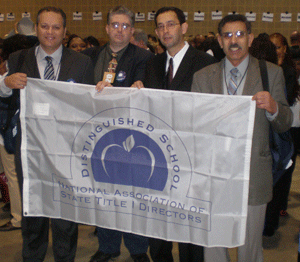When it comes to handing out funds to local schools, scores on the Michigan Educational Assessment Program (MEAP) tests are an important factor.

|
|
Oakland Superintendent Ahmed Saber (left), and faculty members Conrad Koch, Adnan Aabed, and Eraqi Eraqi. Photo courtesy of Conrad Koch |
“The accountability of sub-groups like the one we’re in, I can say it is unfair,” said Abed Adnan Aabed, who is principal at Oakland International Academy in Detroit on the border of Hamtramck.
The Academy, a charter school of grades 7-12 of mostly kids from low-income families, suffered from low test scores due in large part to a language barrier, as its 97% Arab, mostly Yemeni student base had a large group of English as a Second Language kids.
On top of that, the school’s relatively low graduation rate also suffered due to students shuffling back and forth between the school and overseas, hurting funding more.
But instead of running from the problems, Aabed decided to take them head on, hiring more bi-lingual support staff and offering more after-school tutoring programs.
Now, it has paid off, as the school received the Distinguished Title I School of the Year Award, which is given out to one school in each state and was awarded in San Antonio, Texas from Feb. 19-22 of this year.
Oakland International Academy improved its English Language Arts (ELA) proficiency from 2005-06 to 2007-08 by 69% and mathematics proficiency scores by 85%, a staggering jump.
Aabed said that a snowball effect began to take place as students began to achieve better results on the tests.
“We used to have a false perception in the community that we are a failure of a school, but we presented results to them and they saw we were doing better than any school in the area,” he said. “That gives kids motivation and they see themselves starting to succeed and achieving more and more and working harder.”
Aabed said that the parents have always been supportive of their kids and that the kids were willing to learn, but the language barrier was always a big problem.
The state only gives each English as a Second Language student ten months before their scores are counted towards the school’s totals, but Aabed said that it typically takes about 5-7 years to learn English.
“We have a very well-qualified bi-lingual staff and teacher aid,” said Aabed. “They help us a lot in pulling up kids and working on them individually. We focus on math and science and reading which we have found to be most important for the students to learn.”
Another important change Aabed instituted was holding a first hour English as a Second Language class for kids from 8-9 a.m. each day, separating them from the rest of the student body so they could receive more help.
Teacher Eraqi Eraqi, or Eraqi-squared as his students call him, said that the tutoring program has also been a huge part of the school’s recent successes.
“Kids love to stay here after school, we have a computer lab with the Arabic Rosetta Stone software programs and kids enjoy being here,” he said.
“Sometimes we put pressure on kids to come if their grades are low and some of them don’t come on the first day. But on the second day we get them here by calling the parents and they encourage them to stay here.”
Eraqi said even the A students have become avid after-school studiers who enjoy the challenge of becoming leaders by engaging in group work with their peers and teaching them in the areas of math and science.
It’s all part of a growing family-style community vibe at Oakland International Academy. While many of the students were lost or low on confidence in the past, those problems are waning as students receive the increased support provided by Eraqi, Aabed, and the staff.
“We have very, very good kids in the community,” said Eraqi. “We are isolated in the Hamtramck corner of Detroit and they don’t want to go to the other schools, so we try to give them a good environment like home here.”






Leave a Reply